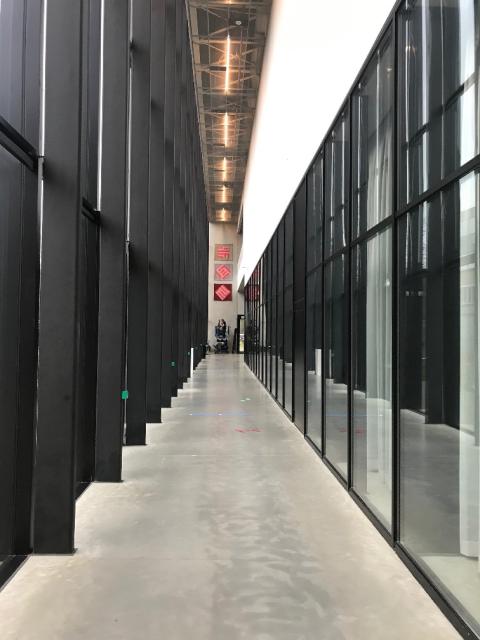Sigrid Calon
Weaving Character (2020, textiles)
CUBE

In 2018, CUBE, a building entirely dedicated to education, was inaugurated. Almost simultaneously, the university's Educational Vision was presented, which focuses on knowledge, skillm and character. For the university's Art Committee, both events were a reason for an art design in the building, with the motto Weaving Character, a passage from the Vision underlying the Educational Profile. In this Vision a link is made with the ideas of Marinus Cobbenhagen, who saw the university as an 'interwoven' community of lecturers, students, and graduates and who advocated a broad education, in a scientific, social, and Catholic sense.
The art design is by Sigrid Calon and aims to address concepts such as character building, identity, and interconnectedness in a contemporary way, connecting them to the body of thought that underlies the special institution that is Tilburg University. Artist Sigrid Calon used abstract patterns derived from the university's logo. The squares of the logo represent the various entities of the university, which together form a whole. With this, numerous variations can be made, expressing the idea that while characters can be formed, they vary by nature. Calon also raises the concept of identity by presenting the woven patterns and surfaces in flag form. Flags, after all, are abstractions of nations, organizations, (student) associations, et cetera, always referring to what connects.
The Tilburg Educational Vision is a specification of the previously determined motto of the university: Understanding Society. As a broad concept, the Vision has its roots in two movements. It is a contemporary form of the classical Bildung, with the German educational reformer Wilhem von Humboldt as its spiritual father, who at the beginning of the 19th century based his plans for the Freie Universität Berlin on the idea of “general human and broad education.” Education and research are connected there, transcending the boundaries of professional disciplines. Students should be able to form themselves freely into "complete" human beings who have also immersed themselves in culture, philosophy, and religion. In the 21st century, this is called something else: intellectual independence, self-reflection, social and scientific responsibility, critical attitude, morality, and entrepreneurship. These are important values that are serving in a rapidly changing society that is looking for anchor points, for connection.
With the concept of weaving character, the Educational Vision adopts the views of Cobbenhagen and Von Humboldt in a contemporary way. However, the Vision also refers in another way to interconnectedness, namely that between university and city: "We have opted for the expression “weaving one's character” in reference to the textile industry, which played such a prominent role in the emergence and transformation of Tilburg as a city—also nowadays. In the process of weaving, warp and weft combine to create cloth, tapestries, or clothes, yielding a unique fabric ultimately meant to serve a purpose, but also having an aesthetic value of its own. It is a metaphor that we feel fits the education and training of Tilburg students in the course of Tilburg University's pedagogical history and tradition."
The carpets were woven by the Textiel Lab, affiliated with the Dutch Textile Museum in Tilburg. Three colors were always used, because of the three principles in the Educational Vision and recycled materials were used.
More about history and academic heritage
The Tilburg University academic heritage is a very diverse set of archives, visual materials, collections, devices, recorded stories, et cetera that relate to the history of the university.